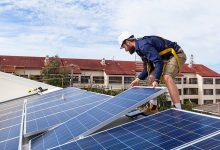Strong demand for jobs in the renewable energy sector has created industry-leading wages growth for Australian professionals, with wages for some positions expected to grow by more than 20 per cent, positioning the local renewables sector as a rare source of optimism in a sluggish jobs market.
In a salary survey completed by global recruitment firm Robert Walters, the energy and technology sectors are expected to see strong demand for labour, driving strong growth in wages.
Various positions within the renewables sector make up three of the top ten positions ranked by Robert Walters for expected wages growth over the next 12 months. Renewable energy project managers and asset managers employed in New South Wales and Queensland are expected to enjoy some of the best wages growth in Australia in 2020.
However, the firm noted that uncertainty remains over the future of the renewable energy sector, as policy uncertainty continues to cloud the future for renewables investment.
“While the emerging renewables sector is showing signs of promise, and the creation of some new jobs, uncertainty may linger until the Australian government articulates a more comprehensive energy policy,” Robert Walters managing director James Nicholson said.
The recruitment firm said that recruiters would also need to remain open-minded when looking for candidates with strong technical experience, with employers needing to invest in training high-potential candidates when new industries are rapidly growing.
“Potential’ should be the watchword for many employers in 2020. During selection processes, employers should remain open-minded when candidates are a good cultural fit but short on technical experience,” Robert Walters said in its report.
“A comprehensive learning and development strategy can help plug technical gaps, whilst also helping to ease the disconnect between skills that the next generation of talent are being taught and what businesses need.”
Robert Walters attributed the strong wages growth in the renewables sector to the ongoing investment momentum in, driven by the substantial pipeline of projects currently under development.
Wages growth was particularly strong in New South Wages, where wages growth for renewable energy asset managers, and operations and maintenance managers, are both expected to see wages growth above 20 per cent in 2020.
It is also expected to be strong in construction management and project management positions, with wages expected to grow by more than 10 per cent in each of the positions as new projects commence in 2020.
Wages growth is expected to be similarly high across both fixed-term contract and permanent positions.
Through the survey, Robert Walters found wages growth would see the median salary paid to renewable energy asset managers grow by 26 per cent to $175,000 in 2020, followed by growth of 22 per cent for an O&M manager, also reaching $175,000.
Grid connection managers topped the list with the highest-paid renewables position, with a median salary of $200,000 with expected growth of 11 per cent in 2020.
This would be of little surprise for those working in the industry, with grid connections emerging as one of the key challenges to the successful completion of renewables projects in Australia.
Robert Walters found the expected median salary for a PV designer would remain stable at $93,000 per annum.
The recruitment firm found that 103 projects were currently under development, totalling more than $27 billion in investment. Robert Walters expects these projects to create an additional 16,000 jobs, driving the growth in wages.
The Australian Bureau of Statistics estimates there were 17,740 people employed in renewable energy activities in the 2017-18 year, up from an estimate of 11,100 in 2015-16, at the bottom of the investment slump triggered by an Abbott government hostile to the renewables sector.
Renewables employment, however, is still down from its historical peak of 19,230 jobs in 2011-12, when surging growth in rooftop solar installations, driven by generous rebates and feed-in tariffs, underpinned strong growth in employment in the rooftop solar industry.
At the time, three out of four renewable energy jobs related to rooftop solar, but this proportion has fallen to less than half of all renewables jobs as of 2017-18, reflecting the growth in large-scale projects and the resulting demand for project and asset management jobs.
Other sectors seeing strong growth wages are positions in IT and technology, as companies continue to push the digital transformation of their businesses, along with the financial services sector, as banks and investment firms continue to repair their businesses following the fallout from the financial services royal commission.
Wages growth in other sectors is expected to remain flat as a result of ongoing policy uncertainty and unresolved global issues like Brexit and ongoing protests in Hong Kong.







